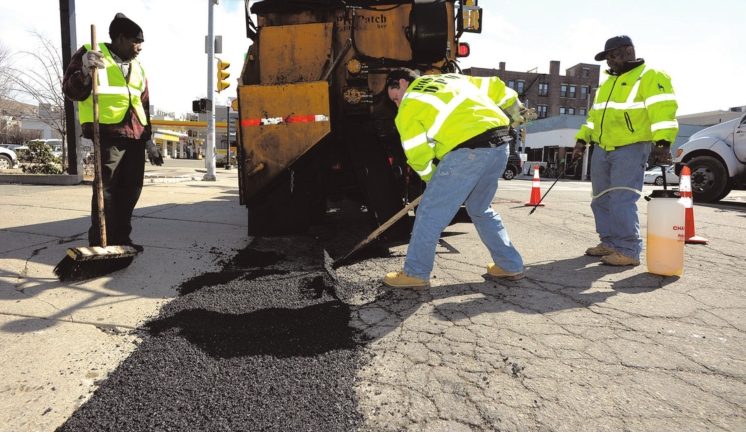

Boston Public Works (BPW) has begun widespread pothole repairs after a winter full of ice and snow.
In addition to spot repairs where necessary, several streets are due for a more comprehensive resurfacing, particularly in Back Bay where Belvidere, Clarendon, and Gloucester Streets will be repaved.
There will also be numerous resurfacing efforts in South Boston, including West First, Second and Third Streets.
In the South End, expect to see resurfacing of East Berkeley, Waltham and West Newton Streets.
There is a map of all street resurfacing plans available on the BPW website under “Roadway Surfacing in Boston.”
Chris Coakley, press information officer for BPW, said, “As Boston experienced high winds, freezing rain, sleet and snow throughout the winter months, there was a concerted effort by the Public Works Highway Division to dispatch patch crews.”
Heavy winter weather means snow and ice repeatedly melts, fills cracks in the streets, re-freezes and expands, leading to potholes.
Now that the winter weather is behind us, patchwork turns to more permanent repairs ahead of the busy spring and summer construction seasons.
BPW has recorded 1,968 requests for pothole repair from January 1 to April 28. This is about the same number of requests as BPW received in half the time last year, having recorded 1,856 requests by February 19 when The Boston Guardian reported this story in 2024.
Back Bay, the Downtown/Financial District and the South End have the most repair requests by far. Each of those neighborhoods have more than 200 outstanding requests, while the next highest, Allston/ Brighton and Roxbury, have just over 100.
But officials acknowledged that not all potholes fall under city responsibility.
"Many of the potholes reported are in fact defects around utility castings. We direct these issues to each utility company for resolution. It is their responsibility to regularly inspect their assets and make the necessary repairs. On private ways, our Highway Division will make any road deficiency safe to ensure first responders can safely navigate the area," said Coakley.
For resurfacing efforts to go smoothly, it’s also crucial that the city is in close communication with the public utility companies about their repairs. Before repaving a street, all necessary utility repairs need to be completed so that the freshly paved street isn't dug up right after.
Resurfacing of streets typically takes five to seven days and the city tries to work at night to minimize disruption to surrounding neighborhoods. Pothole repairs are completed on average less than a day after they are reported to the 311 hotline, according to Coakley.
However, more serious long-term resurfacing efforts are guided by regular assessments.
“Our Construction Management Division routinely assesses and grades the condition of pavement on every street in the City of Boston, and coordinates their resurfacing schedule accordingly," Coakley said.
Potholes do not have to meet a certain size before city crews step in. "Any roadway defect reported via 311 is inspected by our Highway Division and repairs are made as necessary," according to Coakley.